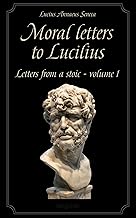
How to Read Seneca's Books on Stoicism
How to Read Seneca's Books on Stoicism
Estimated Reading Time: 10-12 minutes
Introduction
Lucius Annaeus Seneca, commonly known as Seneca the Younger, was a Roman Stoic philosopher, statesman, and playwright born around 4 BCE in Corduba (modern-day Córdoba, Spain). His life spanned a tumultuous period in Roman history, marked by political intrigue, personal tragedy, and philosophical exploration. Seneca's writings, particularly his "Letters to Lucilius," offer profound insights into Stoicism, a philosophy that emphasizes rationality, self-control, and the importance of virtue in achieving a fulfilling life.
Seneca's unique perspective on Stoicism is shaped by his personal experiences with power, exile, and the complexities of human emotion. Unlike other Stoics who might focus more on abstract principles, Seneca grounds his philosophy in the realities of daily life, making his thoughts particularly relatable and applicable. His letters, addressed to his friend Lucilius, serve as a rich tapestry of philosophical discourse, practical advice, and personal reflection, providing a comprehensive understanding of Stoicism's relevance both in ancient times and today.
Why Seneca's Perspective Matters
Seneca's approach to Stoicism is distinctive for several reasons. First, he emphasizes the importance of emotional intelligence and the human experience, acknowledging that while Stoicism advocates for rationality, it does not dismiss the role of emotions. His letters explore the interplay between reason and passion, offering insights that resonate with modern readers facing similar struggles.
Additionally, Seneca's writings are deeply personal. He often reflects on his own life, sharing his triumphs and failures, which allows readers to see Stoicism not just as a set of doctrines but as a practical guide for navigating life's challenges. His exploration of themes such as mortality, friendship, and the nature of happiness provides timeless wisdom that continues to inspire individuals seeking personal growth.
Seneca's influence extends beyond his lifetime, impacting later thinkers and movements, including Renaissance humanism and modern psychology. His ability to articulate Stoic principles in a relatable manner ensures that his ideas remain relevant, making his work essential for anyone interested in philosophy and self-improvement.
Overview of Recommended Books
Letters to Lucilius
"Letters to Lucilius" is a collection of 124 letters written by Seneca to his friend Lucilius, who was a procurator in Sicily. These letters cover a wide range of topics, from ethics and morality to the nature of the universe and the importance of friendship. The work serves as both a philosophical treatise and a personal dialogue, making it a unique contribution to Stoic literature.
Main Themes and Arguments
-
The Nature of the Good Life: Seneca argues that true happiness is found in virtue and wisdom rather than in external possessions or status. He emphasizes the importance of living in accordance with nature and reason.
-
Dealing with Adversity: Seneca provides practical advice on how to face challenges and setbacks with equanimity. He encourages readers to view difficulties as opportunities for growth and self-improvement.
-
Mortality and Time: A recurring theme in Seneca's letters is the transient nature of life. He urges Lucilius to reflect on mortality and make the most of his time, advocating for a life of purpose and intention.
-
The Role of Friendship: Seneca highlights the significance of friendship in achieving a fulfilling life. He believes that true friends support each other in the pursuit of virtue and wisdom.
Key Insights and Takeaways
-
Practice Mindfulness: Seneca encourages readers to be present and mindful of their thoughts and actions. By reflecting on our choices, we can align our lives more closely with Stoic principles.
-
Embrace Adversity: Challenges are an inevitable part of life. Seneca teaches that facing adversity with courage and resilience is essential for personal growth.
-
Value Time: Time is our most precious resource. Seneca advises readers to live intentionally and prioritize what truly matters, as life is fleeting.
-
Cultivate Relationships: Building meaningful relationships is vital for a fulfilling life. Seneca emphasizes that friendships rooted in mutual respect and virtue are invaluable.
Why Read This Book
"Letters to Lucilius" is essential reading for anyone interested in Stoicism because it provides a comprehensive exploration of the philosophy through practical advice and personal reflection. The letters are accessible yet profound, making them suitable for both beginners and those familiar with Stoic thought. Readers seeking guidance on how to navigate life's complexities will find Seneca's insights particularly valuable.
Key Themes and Sections
Seneca's "Letters to Lucilius" is structured around several key themes that collectively address the essence of Stoicism:
-
Rationality and Emotion: Throughout the letters, Seneca discusses the balance between reason and emotion, emphasizing that while we should strive for rationality, it is also important to acknowledge and understand our feelings.
-
Ethics and Virtue: Many letters focus on ethical living, urging Lucilius to cultivate virtues such as wisdom, courage, and justice. Seneca argues that these virtues are the foundation of a good life.
-
Philosophical Reflection: Seneca often encourages Lucilius to engage in self-reflection and philosophical inquiry, which he views as essential for personal development.
-
Practical Wisdom: The letters are filled with practical advice that readers can apply to their own lives, making Stoicism not just a theoretical framework but a practical guide for everyday living.
The progression of ideas in the letters builds a comprehensive understanding of Stoicism, illustrating how its principles can be integrated into daily life. Each letter serves as a stepping stone, deepening the reader's grasp of Stoic philosophy and its applications.
Who Would Benefit from Reading These Books
"Letters to Lucilius" is particularly beneficial for:
-
Students and Academics: Those studying philosophy will find Seneca's insights invaluable for understanding Stoicism's evolution and its practical implications.
-
General Readers Interested in Stoicism: Individuals seeking to improve their lives through Stoic principles will appreciate the accessible nature of the letters.
-
Professionals Seeking Practical Wisdom: Those in high-pressure environments can draw on Seneca's teachings to cultivate resilience and focus.
-
Anyone Looking for Personal Growth: Readers interested in self-improvement will find actionable insights that can lead to a more fulfilling life.
Recommended Reading Order
To maximize your understanding of "Letters to Lucilius," consider the following strategic approach:
-
Begin with: Letters 1-10 - These initial letters introduce key Stoic concepts and set the stage for deeper exploration. They provide a solid foundation for understanding Seneca's philosophy.
-
Focus on: Letters 41-60 - In this section, Seneca delves into the nature of friendship and the importance of ethical living, offering practical advice that resonates with modern readers.
-
Advanced study: Letters 100-124 - These later letters reflect on mortality and the nature of time, encouraging readers to engage in profound self-reflection and philosophical inquiry.
By following this reading order, you can gradually build your understanding of Stoicism while applying its principles to your own life.
Conclusion
Seneca's contributions to Stoicism through "Letters to Lucilius" offer timeless wisdom that remains relevant in our contemporary world. His ability to blend personal reflection with philosophical discourse creates a rich tapestry of insights that can guide readers in their pursuit of a meaningful life.
As you explore Seneca's letters, consider how his teachings can be applied to your own experiences and challenges. Embrace the opportunity for growth and self-improvement that Stoicism offers, and let Seneca's words inspire you to live with intention and virtue.
For those eager to delve deeper into Stoic philosophy, "Letters to Lucilius" is a must-read, providing a comprehensive understanding of how to navigate life's complexities with wisdom and grace.
Featured Books

Letters to Lucilius
by Seneca
Published: 65
The Moral Letters of Lucilius (in Latin, Ad Lucilium Epistulae Morales), is the collection of letters that the Roman Stoic philosopher Seneca (4 BC - 65 AD) sent to his friend, the Procurator of Sicily Lucilius Junior.The letters often begin with a comment about daily life, followed by an abstracted topic or concept based on that comment. The end output resembles a philosophical notebook. Many typical Stoic topics are addressed in the letters, including death's disdain, the sage's steadfastness, and virtue as the highest good.This series was made by the great Latinist Richard Mott Gummere between 1917 and 1925, containing:Volume I (1917): Letters 1 to 65;Volume II (1920): Letters 66 to 92;Volume III (1925): Letters 93 to 124.This is the first volume of the series made in 1917.